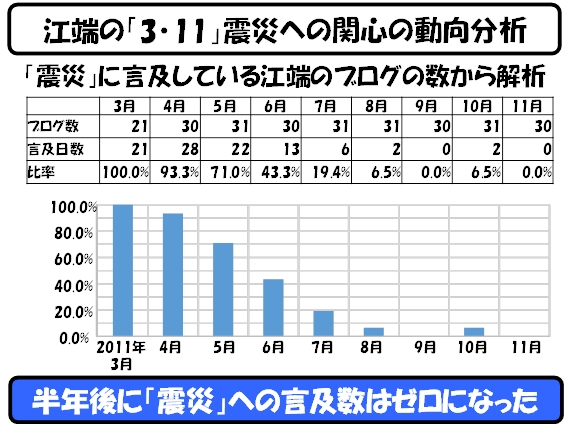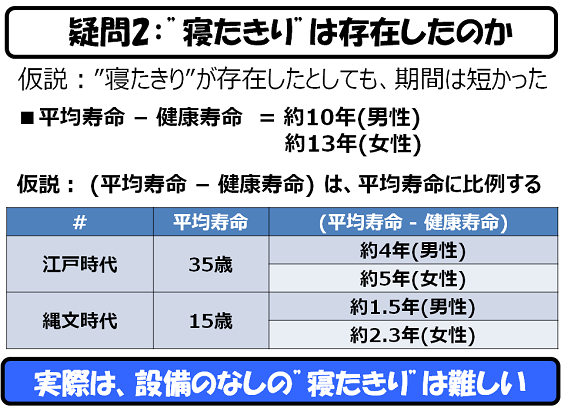「無償の愛」を『無期限』とする計画は、必ず破綻します ―― "必ず"です。
『6ヶ月』 ―― これが、私が計算と経験則から導き出した結論です。
Six months" is the conclusion I have drawn from my calculations and rule of thumb.
【新着記事】「江バ電」で人身事故をシミュレーションしてみた https://t.co/Qxr14X4COB pic.twitter.com/oJlAOsppaG
— EE Times Japan編集部 (@eetimes_jp) June 29, 2016
上記の私のコラムの5ページ目に、以下の記載があります。
You will find the following statement on page 5 of my column above.
■「この私」が、3・11の震災(東日本大震災)をどのように忘れていったのかを、定量的に知りたいと思いました。
- I wanted to know quantitatively how "this I" had forgotten about the 3/11 disaster (the Great East Japan)
■そこで、私がここ何年間、1日も欠かさずに記録し続けているブログを使って、以下のような調査をやってみました。
- I did the following survey using my blog, which I have kept track of without missing a single day for the past years.

-----
高齢者介護 ~医療の進歩の代償なのかhttps://t.co/R1DV5OshVJ pic.twitter.com/IiQbaWM0tR
— EE Times Japan編集部 (@eetimes_jp) July 30, 2018
上記の私のコラムの6ページ目に、以下の記載があります。
You will find the following statement on page 6 of my column above.
■ここから導かれる一つの仮説は、江戸時代以前の"寝たきり"とは、どんなに長くても半年程度であったということです。
- One hypothesis derived from this is that "bedridden" was only for about six months before the Edo period.
■当時の介護技術で、"寝たきり"を3年とか10年のオーダーで成立させるのは、無理だったはずです。
- With the care technology available at the time, it would have been impossible to keep a person "bedridden" for three or ten years.

-----
ウクライナ支援についても、各国の「支援疲れ」は、厳然たる事実です。
As for support for Ukraine, it is a stark fact that countries are "tired of supporting" Ukraine.
期限が定められていない支援に耐えられるほど、私たちは強くないのです。
We are not strong enough to withstand support without a set deadline.
-----
結論:
Conclusion:
(1)「他人への、条件のない愛情(無償の愛)のストックには上限がある」
(1) "There is an upper limit to the stock of unconditional love (free love) for others."
(2)「そのストックは、概ね6ヶ月で尽きる」
(2) "Its stock generally runs out in six months."
(3)「被災地支援、寝たきりの人への介護が「無償」で継続できる期間は、最長で"半年"である」
(3) "The maximum period during which support for disaster-affected areas and care for bedridden people can continue "free of charge" is "six months.
この現実をベースに、私たちは、被災者支援や高齢者介護を計画しなければならないと思います。
Based on this reality, we must plan to support the affected population and care for older people.
「無償の愛」を『無期限』とする計画は、必ず破綻します ―― "必ず"です。
The plan to make "free love" "indefinite" will surely fail -- "surely."